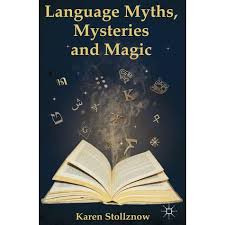Language myths, mysteries and magic.
by Karen Stollznow. 269 pages. Price: too expensive.
Palgrave MacMillan 2014.
Originally, I bought this book in a sale, in order to hand it over to the people behind Linguistic Mythbusters. A book with such a title would contribution to their mission to debunk widespread but untrue ideas about languages. The book has “language myths” in the title, so it should fit their turf. But I thought, I will read it myself first. And while I was reading it, I thought, I am going to keep it for myself, it is too good to give away. In the meantime, it also appeared to me that Linguistic Mythbusters’ activity level was so low, that it would go to waste if I would donate it to them. That was another reason to keep the cherished book, quite egoistically, for myself. OK, if Linguistic Mythbusters resurrect like a Phoenix from the ashes, I will make sure they get the book.

The title of the book is perhaps a bit confusing, in that it is less about general myths than about mystic, mystery and magic. It is perhaps the best book popularizing linguistics that I have ever read. On top of that, it is academically solid. Basically, it debunks all nonsense in connection with religion, superstition and supernatural that has come forward in the past millennia, in so far it has a connection with language. From curses, prayers, charms and taboos in language, via radios that supposedly transmit signals produced by life forms from outer space, to telephones communicating with the dead. That is not all. The book also deals with reverse speech with secret messages, satanic instructions by musicians or politicians speaking backwards. The adherents of those nonsensical ideas hear, for instance, messages about hell that some American Christians detect when they play metal music on vynyl backwards. As for the latter, Angus Young of AC/DC commented that one does not have to reverse the direction of the LP record in order to hear such a message, especially when the album is called “Highway to Hell”.

Another favorite of mine in the book is the speech of mediums who, when in trance, appear to speak in other languages than their own, and hypnotized people who suddenly appear to be able to speak other languages, never heard before, including languages from other parts of the world. Sometimes they even utter sentences in extinct languages from millennia ago, such as Sanskrit. Have these people reincarnated, or a connection with people who died ages ago? Even Ferdinand de Saussure was impressed by this particular medium who spoke Sanskrit and other languages. She was even able to transmit the language of the Planet Mars. It is perhaps new to you that its inhabitants have their own writing system as well. Martians also enabled her to telepathically send her visualisations of Martian landscapes that she could sketch, so earthlings could know how Mars looks like. At that time, they did not have a Perseverance cart, they had to use different means. The Martian language, however, appeared a morpheme-by-morpheme transformation of French, the only real language spoken by the medium. No linguist could take this seriously.

Does the Bible contain a secret code? It must. In fact, if you use the right method, it appears that it contains information about the murder of Ghandi and Martin Luther King, the name of Bill Clinton. You just skip most of the Hebrew consonant letters and you fill in vowels of your own choice in order to find the right combination.

There is also the phenomenon of electronic voice phenomena. When I was a teenager, a friend of mine and I had heard a radio program about tape recordings on which one could sometimes hear unintended sounds from earlier times. A bird watcher had, surprisingly, also recorded the songs of birds that had disappeared from the region, and human voice when no one was there. Extinct birds. Mystical voices. Voices produced by the dead could be heard, it was assumed. People also noticed short messages, presumably from dead people, on their tape recordings. One researcher of this phenomenon was a Latvian called Konstantin Raudive. He had caught numerous strange voices on tape. He had promised his colleague voice catchers to leave a message from yonder, if he would die before them. Indeed, a few years after his death, one could hear the chilling words in the background of a tape: Hier ist Raudive. It was scary. But that was all he said. No revelations about how afterlife looks like. My friend and I, we decided to record our conversations, we wanted to experience this. We listened to the tapes again and focused on the detection of voices other than our own. On one of the cassette tapes, when talking about this phenomenon, we clearly heard a voice saying: “Onbegrijpelijk”, i.e. inconceivable. That was scary. Well, maybe it was not so clear. This phenomenon is also described in the book. But it is somewhat outdated now. We can observe that, even though more sounds and conversations are recorded than ever before, by more people than ever, the phenomenon seems to have died out. No one seems to note them, and certainly not at the level that one wants them to shut up.

Apparently, there was also an American who built boxes that would enable you to get messages from some parallel word. It worked more or less in such a way that one would receive signals in between radio channels. Short messages. But one needed a trained specialist to detect what the meanings of the sounds were. Frank’s box. Frank built them. But these messages as well appeared absolutely trivial. “C’mon purple, keep this box”. “I like ice cream”. “I’m a nice kid”. Such utterances do not make you long for the afterlife.
The book also has a chapter on the foreign accent syndrome. It is a rare phenomenon, but on the other hand it is common enough that one can find genuine examples on Youtube and in the media. What typically happens is that people, from one day to another, start speaking their native language with a strong accent. Maybe they hit their head, or they have a light stroke – it is clearly something neurological. And after that day, they speak their native English with, for instance, a French, Italian or Chinese accent. The question is, whether it is really such an accent, or just some acquired pronunciation disorder, which people associate with an accent that they have heard before. Unfortunately, there is very little scientific research on this.
Can animals talk? The short answer is “no”. The book describes some cases of talking animals, that were either hoaxes, or Clever Hanses. The author does not believe in psychic pets either. How do cryptozoologists work? Some have claimed that they have recorded sounds of the Sasquatch. The evidence is not convincing. This is Bigfoot talking:
Ram ho bä rü khä hü
Wam vo hü khö khu’

We also learn that bigfoot speaks twice as fast as humans, according to the researchers. Good to know. They have not quite been able to understand the message behind these words. Working on it.
There are many other enjoyable topics in the book. Chain letters and the threats if you do not send it on within days of receiving it. Scam letters: you have won the lottery, you have inherited a large some of money, you are next of kin of someone. Sending emails to God. The author deals with these topics, and in some cases, she is herself active as a skeptical investigator.
I thoroughly enjoyed the book. Well written, with a good dose of humor, and academic throughout. References to scientific work and the daily press. A scholarly account of non-scientific approaches to language. A sobering overview of the linguistic equivalents of Q-Anon.
It is too expensive for people like you and me, but luckily there are libraries as well.
Peter Bakker is a linguist at Aarhus University, where he has his hands full studying some of the 8,500 languages of the world, and no time for nonsense – unless it makes him laugh.







